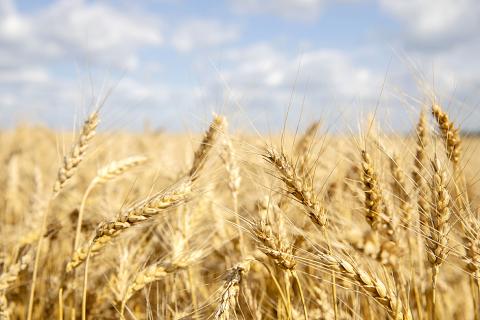A delegation led by Council of Agriculture Deputy Minister Chen Junne-jih (陳駿季) departed for the US yesterday, where it plans to sign a US$3.6 billion deal in Washington to buy US soybeans, corn, wheat, beef and other agricultural products.
The council has carefully evaluated the nation’s market demands, and the deal would benefit Taiwan-US economic cooperation, Chen said.
The council sends a delegation to the US every two years to buy agricultural products and details of each deal are based on market demand and prices, but the quantity it plans to buy has increased this year, he said.

Photo: Bloomberg
Taiwanese farmers use domestic soybeans and corn for fresh feed and imported ones, which are less expensive, for dry feed, he said, which means the imports would not depress domestic prices.
Included in the deal would be exports of US-raised meat, especially beef, the demand for which is increasing every year, he said.
Taiwan is the eighth-largest importer of US agricultural products and an important trade partner to the US, he said.
“Undeniably, the US-China trade dispute has affected US agricultural exports, and the deal is beneficial not only to US farmers, but also to Taiwan, as our nation is now in a better bargaining position in terms of prices,” Chen said.
The Taipei Economic and Cultural Representative Office said the nation is taking action to strengthen Taiwan-US trade and it wishes to be a reliable trade partner.

Taiwanese can file complaints with the Tourism Administration to report travel agencies if their activities caused termination of a person’s citizenship, Mainland Affairs Council Minister Chiu Chui-cheng (邱垂正) said yesterday, after a podcaster highlighted a case in which a person’s citizenship was canceled for receiving a single-use Chinese passport to enter Russia. The council is aware of incidents in which people who signed up through Chinese travel agencies for tours of Russia were told they could obtain Russian visas and fast-track border clearance, Chiu told reporters on the sidelines of an event in Taipei. However, the travel agencies actually applied

New measures aimed at making Taiwan more attractive to foreign professionals came into effect this month, the National Development Council said yesterday. Among the changes, international students at Taiwanese universities would be able to work in Taiwan without a work permit in the two years after they graduate, explainer materials provided by the council said. In addition, foreign nationals who graduated from one of the world’s top 200 universities within the past five years can also apply for a two-year open work permit. Previously, those graduates would have needed to apply for a work permit using point-based criteria or have a Taiwanese company

The Shilin District Prosecutors’ Office yesterday indicted two Taiwanese and issued a wanted notice for Pete Liu (劉作虎), founder of Shenzhen-based smartphone manufacturer OnePlus Technology Co (萬普拉斯科技), for allegedly contravening the Act Governing Relations Between the People of the Taiwan Area and the Mainland Area (臺灣地區與大陸地區人民關係條例) by poaching 70 engineers in Taiwan. Liu allegedly traveled to Taiwan at the end of 2014 and met with a Taiwanese man surnamed Lin (林) to discuss establishing a mobile software research and development (R&D) team in Taiwan, prosecutors said. Without approval from the government, Lin, following Liu’s instructions, recruited more than 70 software

Chinese spouse and influencer Guan Guan’s (關關) residency permit has been revoked for repeatedly posting pro-China videos that threaten national security, the National Immigration Agency confirmed today. Guan Guan has said many controversial statements in her videos posted to Douyin (抖音), including “the red flag will soon be painted all over Taiwan” and “Taiwan is an inseparable part of China,” and expressing hope for expedited reunification. The agency last year received multiple reports alleging that Guan Guan had advocated for armed reunification. After verifying the reports, the agency last month issued a notice requiring her to appear and explain her actions. Guan